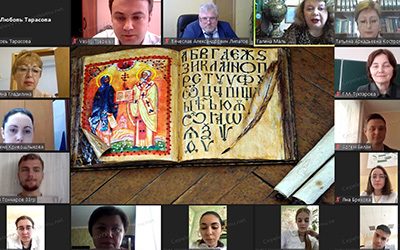The year 2022 was declared by the President as the Year of Cultural Heritage of the Peoples of Russia, which is held with the aim of preserving cultural traditions, historical and cultural monuments. As academician and thinker Dmitry Sergeyevich Likhachev wrote, since ancient times our culture has been a combination of many nations cultures united by a common state principle. Russia was distinguished by the complete absence of “prejudice against all those on whom it extended its influence.”
Historically, many European traditions have also received new life in Russia. Our country has been developing for centuries and continues to develop as a state uniting two worlds: East and West. In order to preserve the cultural heritage , we must pass it from generation to generation – like a baton.
Every year on May 24, the Day of Slavic Writing and Culture is celebrated in all Slavic countries, the creators of Slavic writing, the holy coequal with the apostles brothers Cyril and Methodius – Slovenian teachers are solemnly glorified.
In Russia, May 24 was declared a holiday – the Day of Slavic Writing and Culture – in 1985. In our country, this is the only church–state holiday.
During the celebration, various church events dedicated to Saints Cyril and Methodius are held in the country: divine services in the Assumption Cathedral of the Kremlin and other churches in Russia, processions, solemn liturgies, etc.
Scientific conferences and forums are dedicated to the Day of Slavic Writing and Culture, festivals, exhibitions, book fairs, poetry readings, amateur art shows, concerts and other various cultural events are held.
On this day, the All-Russian Scientific and Practical conference with international participation “Languages of international communication: cultural, historical and professional aspects” was also held.
The objectives of the conference were:
Exchange of scientific and practical experience of specialists of various profiles through discussion of the contribution of various languages to the development and formation of culture and writing, science and medicine;
Generalization and exchange of knowledge in the promotion of scientific developments;
Identification of new areas of application of the results of the work presented in the reports;
Development of contacts of specialists at the intersection of sciences;
Development of interdisciplinary, interregional and international cooperation.
The organizers of the event are the Department of Pharmacology (Head of the Department, Professor Mal G.S.) and the Department of Latin Language and Fundamentals of Terminology (Head of the Department, Associate Professor Kostromina T.A.). The conference was attended by teachers and university students from 29 regions, including the near abroad.
The Vice-Rector for Research and Innovative Development of KSMU, Professor V.A.Lipatov, in his welcoming speech noted the importance of the event for the academic community interested in developing contacts of specialists at the intersection of sciences, expanding international, interregional and international cooperation.
The opening speech was delivered by the head of the Department of Pharmacology, Professor Galina Sergeevna Mal, who highlighted the long path of the evolution of writing and the contribution of the great enlighteners of the Slavic peoples – the holy coequal with the apostles brothers Cyril and Methodius – to the creation of an international, inter-Slavic written language, the first sources of which were theological translations from Greek and Latin. The heir of Slavic writing is our modern writing.
The range of issues discussed includes scientific developments, the focus of which is on the languages of international communication: Latin and Russian. 103 participants of the Plenary session heard 3 reports, then the audience was divided into four sections, where 42 reports were presented. 152 people took part in the breakout sessions. A collection of conference materials is also being prepared for publication.
The role of the Latin language in the formation and evolution of European civilization is clearly reflected in the statement of the philosopher and historian O. Rosenstock–Hussey: “Latin is the unity of humanity, the unity of religion, politics, science and art.”
The contribution of the Latin language to the professional language of medicine is invaluable. International scientific nomenclatures use Latin as a sample, including national languages.
National languages, including, of course, the Russian language, when denoting traditional and new scientific concepts in anatomy, clinic, pharmacy, use Greek-Latin word-forming elements. Speaking in Russian, the doctor uses up to 60% of words of Latin origin. The Latin language provides the formation of terminological literacy and the general cultural level of the specialist.
The importance of studying Latin as a professionally oriented humanitarian discipline of a medical university was noted by the speakers.

